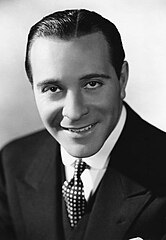Ricardo Cortez
 | |
| Imię i nazwisko | Jacob Krantz |
|---|---|
| Data i miejsce urodzenia | |
| Data śmierci | |
| Zawód | |
Ricardo Cortez (ur. 19 września 1899, zm. 28 kwietnia 1977) – amerykański aktor filmowy pochodzenia austriackiego.
Filmografia
- 1919: The Imp
- 1924: Skandal towarzyski jako Harrison Peters
- 1927: Nowy Jork jako Michael Angelo Cassidy
- 1930: Jej mężczyzna jako Johnnie
- 1932: Trzynaście kobiet jako Sierżant policji Clive
- 1936: Zemsta Johna Ellmana jako Pan Nolan
- 1944: Make Your Own Bed jako Wilson / Fritz Alden
- 1958: The Last Hurrah jako Sam Weinberg
Wyróżnienia
Posiada swoją gwiazdę na Hollywoodzkiej Alei Gwiazd.
Bibliografia
- Ricardo Cortez w bazie Filmweb
- Ricardo Cortez w bazie IMDb (ang.)
- Ricardo Cortez. latimes.com. [dostęp 2015-10-12]. (ang.).
Media użyte na tej stronie
Ricardo Cortes, studio publicity portrait circa 1935
- Copyright details
Additional source information:
This is a publicity photo taken to promote a film actor. As stated by film production expert Eve Light Honthaner in The Complete Film Production Handbook, (Focal Press, 2001 p. 211.):
- "Publicity photos (star headshots) have traditionally not been copyrighted. Since they are disseminated to the public, they are generally considered public domain, and therefore clearance by the studio that produced them is not necessary."
Nancy Wolff, includes a similar explanation:
- "There is a vast body of photographs, including but not limited to publicity stills, that have no notice as to who may have created them." (The Professional Photographer's Legal Handbook By Nancy E. Wolff, Allworth Communications, 2007, p. 55.)
Film industry author Gerald Mast, in Film Study and the Copyright Law (1989) p. 87, writes:
- "According to the old copyright act, such production stills were not automatically copyrighted as part of the film and required separate copyrights as photographic stills. The new copyright act similarly excludes the production still from automatic copyright but gives the film's copyright owner a five-year period in which to copyright the stills. Most studios have never bothered to copyright these stills because they were happy to see them pass into the public domain, to be used by as many people in as many publications as possible."
